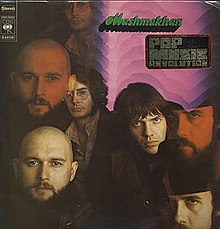
Robert Clark Seger is an American singer, songwriter, and musician. As a locally successful Detroit-area artist, he performed and recorded as Bob Seger and the Last Heard and Bob Seger System throughout the 1960s, breaking through with his first album, Ramblin' Gamblin' Man in 1968. By the early 1970s, he had dropped the 'System' from his recordings and continued to strive for broader success with various other bands. In 1973, he put together the Silver Bullet Band, with a group of Detroit-area musicians, with whom he became most successful on the national level with the album Live Bullet (1976), recorded live with the Silver Bullet Band in 1975 at Cobo Hall in Detroit, Michigan. In 1976, he achieved a national breakout with the studio album Night Moves. On his studio albums, he also worked extensively with the Alabama-based Muscle Shoals Rhythm Section, which appeared on several of Seger's best-selling singles and albums.

Heart is an American rock band formed in 1967 in Seattle, Washington, as The Army. Two years later they changed their name to Hocus Pocus. The year following they changed their name to White Heart, and eventually changed the name a final time to Heart, in 1973. By the mid-1970s, original members Roger Fisher (guitar) and Steve Fossen had been joined by sisters Ann Wilson and Nancy Wilson, Michael Derosier (drums), and Howard Leese to form the lineup for the band's initial mid- to late-1970s success period. These core members were included in the band's 2013 induction into the Rock and Roll Hall of Fame.

Mashmakhan was a Canadian rock band formed in 1969 in L'Île-Perrot, Quebec. The band is best known for their 1970 hit single "As the Years Go By". The song reached No. 1 in Canada, and the Top 40 in the United States. The song was also a major hit in Japan.

Decade of Decadence 81–91 is a greatest hits compilation album by the American heavy metal band Mötley Crüe, released on October 19, 1991. It peaked at number 2 on the US Billboard 200 chart. It was the band's sixth album overall and the first of many greatest hits compilations.
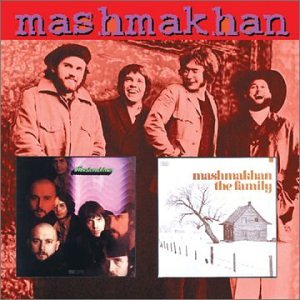
Mashmakhan/The Family is a 1995 album by the Canadian rock band Mashmakhan, compiling both of their early 1970s albums.

Mars Audiac Quintet is the third studio album by English-French rock band Stereolab. It was released on 2 August 1994 and was issued by Duophonic Records and Elektra Records.

"Borderline" is a song by American singer Madonna from her debut studio album Madonna (1983). Written and produced by Reggie Lucas, the song was remixed by John "Jellybean" Benitez. It was released by Sire Records as the fifth and final single from the album on February 15, 1984. The song is also included on Madonna's greatest hits albums The Immaculate Collection (1990) and Celebration (2009).
Giles, Giles and Fripp were an English rock group, formed in Bournemouth, Dorset in August 1967. It featured brothers Michael Giles on drums and vocals and Peter Giles on bass guitar and vocals, and Robert Fripp on guitar. The band's music showed an eclectic mix of pop, psychedelic rock, folk, jazz, and classical influences. The group eventually evolved into pioneering progressive rock band King Crimson.

Moby is the debut studio album by American electronica musician Moby, released in July 1992 by record label Instinct.

Maybeshewill are an English post-rock band from Leicester, England. Their music is characterised by the use of programmed and sampled electronic elements alongside guitars, bass, keyboards and drums.
"Don’t Make Promises" was the first track on Tim Hardin's debut album Tim Hardin 1, released in 1966. The song, along with "Reason to Believe," was one of the two major songwriting hits from the album, with more than a dozen cover versions having been recorded following its release. British radio presenter and writer Charlie Gillett noted the song's ability to achieve "the elusive balance between personal miseries and universal sufferings," while author Mark Brend praised the song's "fragile pop sensibilities" and how it contrasted with the "swaggering" R&B of album track "Ain't Gonna Do Without."

Quique is the debut album by British music group Seefeel, released through Too Pure in late 1993. A predominantly instrumental recording which utilises elements of both rock and electronic music, it blends styles including techno, dream pop, ambient, and dub. Guitarist Mark Clifford worked continuously on tracks while other members either completed them or provided component ideas.

Premonition is the second studio album by Vampire Rodents, released on May 19, 1992 by V.R. Productions. The album represented a musical shift for the band with the introduction of string instruments and further influence of classical music in the compositions. The album contains the most writing credits for composer Victor Wulf, who composed the music for five out of its twenty-one tracks.
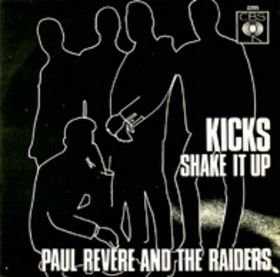
"Kicks" is a song composed by Barry Mann and Cynthia Weil, best known as a 1966 hit for American rock band Paul Revere & the Raiders.
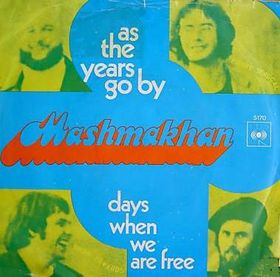
"As the Years Go By" is the first single by rock fusion band Mashmakhan from their self-titled debut album. The single was recorded in Columbia B Studios and was released as the first single to Mashmakhan's self-titled debut album. The other single "Days When We Are Free" was used as the A-side to the 45rpm. "As the Years Go By" was also fit into several compilation albums of '70s songs.
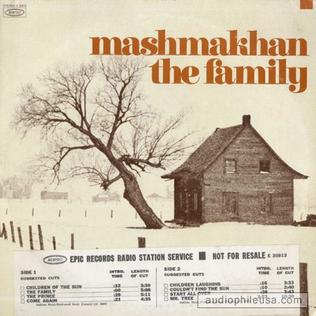
The Family is the second studio album by Canadian Rock fusion band Mashmakhan.
Jigmastas are an East Coast underground hip hop group based in Brooklyn. The group consists of DJ Spinna and MC Kriminul.

"Stop the Rock" is a song by British electronic music group Apollo 440 from their third studio album, Gettin' High on Your Own Supply (1999). Released on 16 August 1999, the song has been described as the group's breakout single.

In the Spotlight is the fifteenth studio album by the American singer-songwriter and bass guitar player Suzi Quatro.

"Should I Stay or Should I Go" is a song by English punk rock band the Clash, from their album Combat Rock, written in 1981 and featuring Mick Jones on lead vocals. It was released in 1982 as a double A-sided single alongside "Straight to Hell", performing modestly on global music charts. In the United States, "Should I Stay or Should I Go" charted on the Billboard Hot 100 without reaching the top 40. The song received greater attention nearly a decade later as the result of an early-1990s Levi's jeans commercial, leading to the song's 1991 re-release, which topped the UK Singles Chart and reached the top ten in New Zealand and many European charts. The song was listed in Rolling Stone's 500 Greatest Songs of All Time in 2004.
